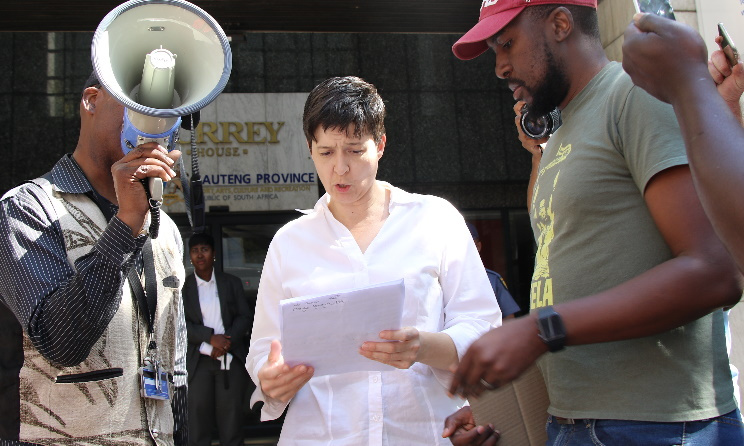SA music bodies, artists march against Copyright Amendment Bill in Joburg
The Trade Union for Musicians of South Africa (TUMSA) and the Music Publishers Association of South Africa (MASA) led a peaceful demonstration in Johannesburg yesterday, which was intended to implore President Cyril Ramaphosa not to sign the contentious Copyright Amendment Bill into law.
 Protesters, led by Gabi Le Roux and David Alexander, marching against the Copyright Amendment Bill in Johannesburg, South Africa, on 28 August. Photos: Music In Africa
Protesters, led by Gabi Le Roux and David Alexander, marching against the Copyright Amendment Bill in Johannesburg, South Africa, on 28 August. Photos: Music In Africa Sport, arts, culture and recreation head of department Monica Newton inspects the memorandum that will make its way to the president. Photo: Music In Africa
Sport, arts, culture and recreation head of department Monica Newton inspects the memorandum that will make its way to the president. Photo: Music In Africa
The two bodies marched with a low turnout of protesters from Mary Fitzgerald Square in Newtown to the Gauteng sport, arts, culture and recreation MEC's offices in the CBD where they handed a memorandum that will be submitted to Ramaphosa.
The Copyright Amendment Bill has been on Ramaphosa's desk for more than a year and critics say signing it into law will tip the scales for creators of musical works, among others, while giving users, including big multinational streaming companies, free content.
MASA’s Marc Rantseli called on Wednesday's protestors to sign the memorandum, which was handed over to sport, arts, culture and recreation head of department Monica Newton, who assured the marchers that the document would make its way to the presidency.
“We will expedite its process as soon as we can. Obviously there are protocols to be followed but we will certainly make sure that we submit it as soon as possible,” she told Music In Africa.
Part of the memorandum reads: “The creative sector supports the positive intentions of the bill as detailed in the preamble. It is our wish that the president grants the creative sector a much-needed voice in the process in order to ensure that unintended consequences are mitigated.”
The demonstration also comprised members and staff of the Southern African Music Rights Organisation (SAMRO), the Composers, Authors and Publishers Association (CAPASSO), Sheer Publishing, the Coalition for Effective Copyright, South African Creative Practitioners in Unity as well as a number of artists.
MASA vice-president Marc Ranseli said the bill had the potential to further hurt the precarious creative sector.
“In the late 1980s, the music industry was generating a tune of R3bn [$200m] and it went down to about R600m in 2006,” he said. “Those are big numbers and our problem is that as the industry is plummeting. Don't let the Copyright Amendment Bill make it worse by allowing corporates to do what they want with our works. We will carry on with the protests even if the bill is signed into law.”
Ranseli also blamed South Africa's political class for turning a blind eye on the arts industry. “It actually shows that the support that we need from people in power is not enough and it’s unfortunate that the industry, especially music, did a lot of work for them to be in power.”
TUMSA’s Gabi Le Roux said the bill was flawed in its fundamental understanding of copyright. “It’s important that I point out the biggest flaw of the bill, which introduced the notion of fair use. This clearly favours the users at the cost of the creators. In the old way of proving exceptions to certain copyright usages, they were clearly defined and listed. Instead of making the list longer, they've made things vaguer and reliant on case law, which we don’t really have in South Africa as opposed to the US where they have extensive case law that one can refer to in specific cases where copyright is infringed."
Commenting on the march's low turnout of about 50 people, Le Roux said: "People become apathetic if you say the same thing to them for a year – particularly musicians who have been deprived for so long.”
MASA general secretary Mbongeni Ndlovu said the bill abandoned every good intention for the creative industry. He said MASA's biggest concern was Section 12 of the bill, "which talks about the general exceptional cases of copyright such as the right to use the work without having the obligation to pay and without asking for permission. So those exceptional cases are for educational purposes, news reporting, personal use or private or for non-commercial use.”
Sheer Publishing founder and managing director David Alexander agreed with Ndlovu, saying the bill was not fit for purpose. “We believe that as publishers, writers, artists and record labels, our livelihood will be negatively affected if this bill is signed into law. We understand that the government’s intention is to provide for a legislative environment that is strong to protect local creators, but this is not that," Alexander said.
Also in attendance was renowned South African writer and theatre producer Mbongeni Ngema, who said the bill's consultative process was found wanting.
“I come from KwaZulu-Natal [KZN], even though I live in Johannesburg. We all know that the drivers of the music industry in this country are from KZN, but people in that province were never consulted about the Copyright Amendment Bill and this will affect their lives. I am personally not worried about how this bill will impact me but I am worried about the coming generations after I am gone. How will they view me?”






















Commentaires
s'identifier or register to post comments